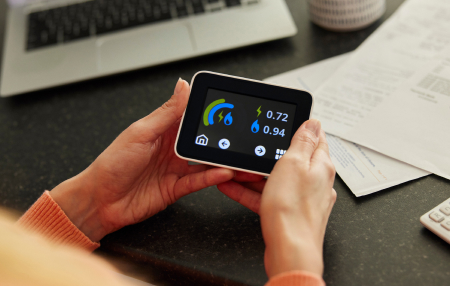
Energy bill debts are any debts associated with the energy usage in your home. This includes all forms of fuel bills, including mains gas and electricity for powering household appliances and central heating. These bills are usually taken monthly and failing to keep up with your energy bill payments could see your energy supply switched off as well as potential further charges being added to your account.
What are energy bills?
Energy bills are recurring charges associated with the continued supply of energy to your home or residence. They are typically charged monthly, but contracts can be made annually or quarterly. Bills are dependent on your energy usage and homes will typically see higher energy costs in winter months due to colder weather and fewer daylight hours. This is a service associated with keeping your home comfortable and liveable.
How could I go into debt with my energy bills?
If you fail to make payments to your energy provider on time, you could fall into debt. This can happen particularly in times of rising costs and higher living expenses. As wholesale prices rise, service providers such as energy and gas companies will charge more for services.
In the UK, energy charges are capped up to a certain limit, known as the energy price cap.
What happens if I can’t pay my energy bills?
If you’re unable to pay your energy bills, you’ll fall into arrears with your service providers. Once in arrears, you’ll be expected to make up any missed payments and may be charged additional late fees. If you’re still unable to pay, you could risk losing your energy supply and having your access switched off as a result.
If your energy bill debt continues to go unpaid, your debt can be passed over to a collection agency, who will begin to chase you for the debt alongside any additional fees they may apply. Contact from a debt collection agency may escalate from phone calls and letters to legal action and home visits.
Is there help available for energy bill debt?
If you’re struggling to keep on top of your energy bills, help is available. First, you should see if you can be put onto your supplier’s priority services register. This is a service provided by energy suppliers and providers that offers extra support to those struggling to make payments on time.
You should also check to see if you’re entitled to any benefits or government help. You can check which benefits you may be entitled to on the government website.
Finally, if you’re still struggling with your energy debts, it’s worth seeking debt advice from a professional debt advisor. They should be able to help you complete a review of your overall finances and any other types of debts you might have, then find a debt solution that works for your situation.
For free debt advice you can visit MoneyHelper.
If you wish to speak to a MoneyPlus advisor, head over to MoneyPlus Advice to learn more.

“All staff are amazing… nothing ever seems like too much trouble. “
— Linda, Greater London
Read Linda’s story…
Tips for paying your energy bills
It’s important to keep on top of your household energy bills to avoid going into debt with your supplier. Paying your priority bills should be at the top of your financial list and should be your main focus when budgeting.
Below, we’ve listed some tips for staying up to date with your energy bills:
Call your supplier: If you’re struggling with your energy bills, the first step should be to call your supplier. By calling your supplier early you can help minimise the damage of missed payments and may be able to discuss any support plans or packages that might help with your payments. Suppliers have a number of systems in place to protect vulnerable customers, so be sure to reach out if you feel you need additional support.
Keep a written budget: With so many bills and essential payments coming out each month, it can be hard to keep track of everything. Keeping a written budget of all your energy bills can help you get a clearer idea of exactly how much you’re spending each month. This can help you to understand how much you’ll need to set aside each month to stay on top of your energy bills.
Check your eligibility for help: If you’re finding it hard to pay your energy bills, it’s vital that you explore your eligibility for for any help or assistance to prevent you from falling into arrears. Estimates say that more than £13 billion in UK benefits remain unclaimed. If you’re not sure whether you’d qualify for energy bill assistance, you can find out using benefits checks either with Turn2Us or through the GOV.UK website.
Install smart meters: They’re called smart for a reason! Smart meters help you get a more detailed breakdown of your home’s energy usage, meaning you can find out exactly where your money is going. This can help you identify saving opportunities to cut down your energy costs and help you become more energy conscious at the same time.
Can I have my energy bill debts written off?
While you can’t have your energy bill debts written off, there are a number of options that suppliers must agree to if you are unable to pay. If you receive benefits or some form of pension credit you can apply for the Fuel Direct Scheme, for example. This allows you to pay your energy bill debts through your benefits and suppliers must oblige a Fuel Direct request.
If you don’t receive benefits but are still struggling to afford your energy bills, your supplier is likely to offer you an alternative repayment plan that takes into account what you can reasonably afford to pay. The exact terms can vary depending on the supplier and your circumstances, but your new repayment plan may include the removal of extra charges and late fees.
Can my energy supply be shut off if I am unable to pay my energy bills?
Yes, if you continue to leave your energy bills unpaid your supplier can disconnect your supply, although there are rules that they must follow before doing so.
Suppliers must wait 28 days from the date of your unpaid bill before they can take action to turn off your supply.
Additionally, they can’t turn off your supply without due warning. Once the 28-day period has elapsed, suppliers must give you a seven-day notice, in writing, before disconnecting your supply.

Are you struggling with debt?
There are always solutions, no matter what your situation.
At MoneyPlus we understand that every financial situation is different, and approach every customer with the care and individuality that they deserve.
So, get in touch today and start living better with MoneyPlus Advice.

